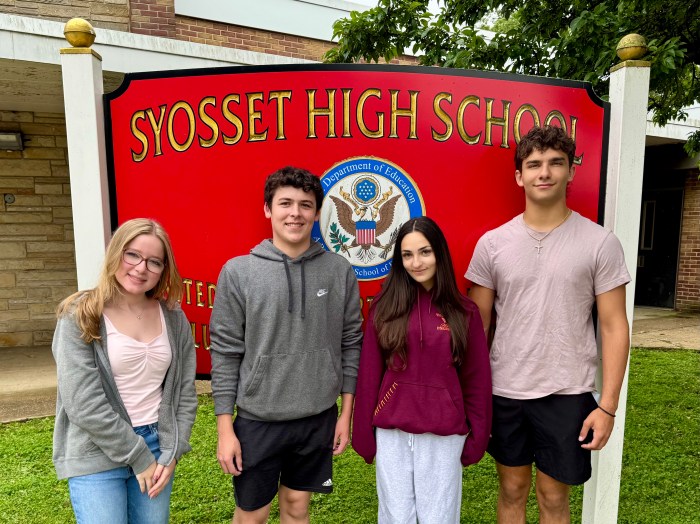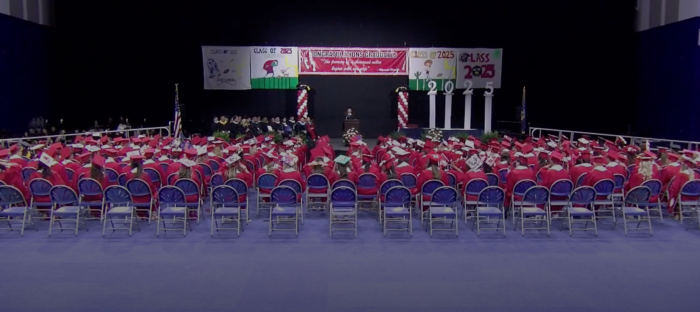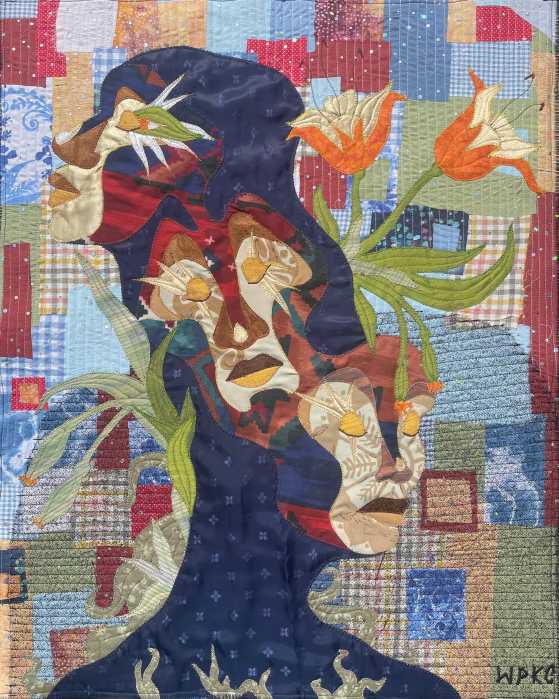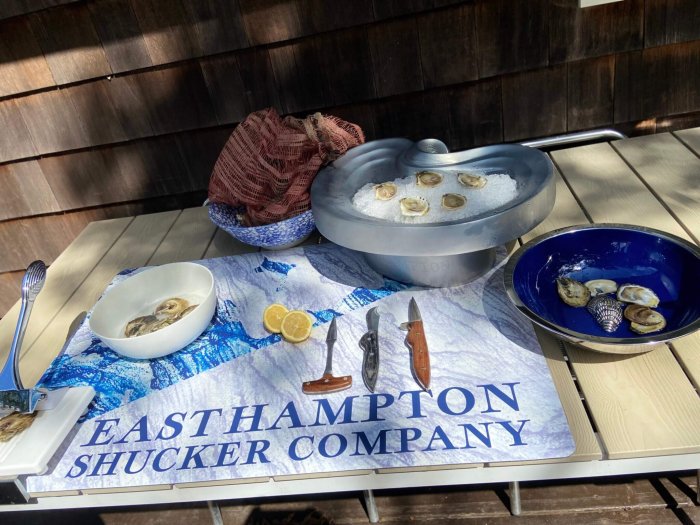The Oyster Bay Town Board put itself on the line as it put up a resolution on the May 26 meeting agenda to prohibit street side solicitation. The resolution was aimed at solving the long existing problem of day laborers hoping to be picked up for work as they stand on street corners along Forest Avenue in Locust Valley in the numbered streets located near the City of Glen Cove.
During the hearing, about 30 Hispanic men sat quietly listening to the speakers.
Felicia Plumb, the daughter of Martinez de Mar Antona, lives in the area of Locust Valley most impacted by the presence of the men. “It’s a safety issue,” she said. “It’s not an issue of prejudice. No. My dad was born in Spain. He came here and went to school to learn the language and raised six kids.” Her son Brian was the last speaker that evening.
Donna Swanson, deputy town attorney, presented the case to prohibit the solicitation of employment from streets and sidewalks for the safety of pedestrians, motorists, and the solicitors, too. Another aspect of the problem is that drivers stop to pick up the workers and block the right of way.
Mr. Venditto added that if the proposed law is passed, it would be unlawful for drivers to accept solicitations or to solicit, and the drivers would be fined $250.
Mr. Venditto said the issue involves residents of Locust Valley who see a problem of safety and welfare of residents versus a group of people who want to be gainfully employed. It is a balancing act of wanting to protect residents and yet “not to impede those who want to work.” Mr. Venditto said he had mixed feelings about the ordinance, and as a result he and the board were interested in hearing what people had to say. He invited people to speak for as long as it would take. He said the this is what the board is all about: that people who need help can come to express their views. He asked only that the discourse be done in an orderly and civil manner.
Hazel Weiser of the Nassau County Human Rights Commission said the way to bring the parties together was to sit down and talk to each other. “There are ways to make people not to feel threatened.” She suggested making laws was not the way to go, especially since, “We share wanting to make a decent wage.”
Don Friedman, an advocate for low income New Yorkers, said that laws are ineffective in that they intend to criminalize behavior of those trying to support themselves. He said a solution was worker’s centers.
Councilman Anthony Macagnone said, “We have unions that are open to all workers. I’m a union representative and we take anyone who wants to work.”
Locust Valley resident Robert Vessichelli said it was nice to see local law leaders struggling to find a solution.
Supervisor Venditto said they were trying to act in a situation where the federal government has abdicated its obligation to its citizens and immigrants and has created this chaos. The reality is that this country was settled by immigrants. “Residents have put their life blood into their homes and people are frightened and afraid.”
Mr. Venditto said his father came here when he was 15 years old. “He was spat upon and called dirty names. They told him to follow the rules but that was 70 years ago. For the last 40 years our government turned its back to the problem so we are left to fight each other.” Part of the issue is that the workers themselves are not benefiting: They get no [health and Social Security] benefits, and are paid less wages. Mr. Venditto said, a solution was for the workers to get on the road to citizenship. There was applause from the audience.
He told the many day laborers attending the hearing, their job was to learn to blend in with this society. He told the story of when Luz Torres, who is director of the Hispanic Cultural Center, asked the town to put up signs in Spanish, he said no. Instead he said the town would pay for English as a Second Language courses which it has done. He said recently Ms. Torres wrote a letter thanking him for those classes saying, “Now they can integrate with society and are talking with their children’s teachers.”
“We have to work together to find a solution,” he said.
Mr. Robert Vessichelli said he worked for five years on the Joint Terrorism Taskforce. He said when his wife wanted to bike to Glen Cove she had to find an alternate route; that he has to walk in the road because the sidewalks along Forest Avenue are blocked. “What about going to a factory and asking for a job?” He asked why the employers who pick them up don’t actually hire them. [Someone told this reporter of a landscaper who now hires day laborers, pays them less than he charges his customers and is doing better than ever financially.]
Tara Keenan-Thompson with the New York Civil Liberties spoke in opposition to the proposed legislation saying it seeks to outlaw the day workers activities; criminalize free speech; which undermines the republic; she said the streets are public forums; the legislation is devisive and the people are looking for work to support their families. She said, “This is criminalizing Latinos.” She added that the law would mean that Girl Scouts like Samantha Muscarella [the councilman’s daughter] would be fined for selling cookies; as well as people raising money for Hurricane Katrina.
Ms. Thompson said the law would lead to lawsuits such as has happened in Arizona, Pennsylvania and Virginia where they were overturned. She said it was a waste of taxpayer money.
Councilman Macagnone said New York State loses $4 billion a year because of illegal workers. He said the union doesn’t question the status of immigrants they just see if they qualify. “We have problems with workers who don’t pay taxes and don’t have benefits,” he said.
“It’s wonderful that you want to weigh the arguments,” said Ms. Thompson. She added, “On what side does the Town of Oyster Bay want to see its name in history?”
“I’m a little disappointed,” said Mr. Venditto to Ms. Thompson of her remark that the legislation was “Anti-Latino.” He added that this is a issue of “commercial speech” which is the least protected form of speech. “Put down your law book and look at the residents. We didn’t make this up.” Her bringing in Girl Scouts; lemonade stands and the constitution was unnecessary, he added. “Go back and read the law.” She answered, “Case work is with me.”
Latino Pride
The next speaker was the Reverend Alan Ramirez of the Old Brookville Church in Muttontown. He began his talk saying this was a historic day for the Latino community in that Judge Sottomayor was nominated to the Supreme Court by President Barack Obama. “It opens up possibilities for all of us,” said the reverend.
He commended the spirit of the board as they addressed “this sensitive and incendiary issue.” He suggested they reflect on how similar issues have been handled in Farmingville where after all the opposition, the ordinances; housing laws; and after 15 years the problems are still there. He suggested listening and reflecting on each other’s views. Suffolk County’s solutions have resulted in brutal beatings; fire that burned a Mexican family’s house; and Marcel Lucera being killed. He said, “I pray we can learn from the mistakes of others. Suffolk County has given Long Island a black eye. We can demonstrate that we are better than that.”
“Dialogue and communication can make people less fearful,” commented Mr. Venditto.
Rev. Ramirez said the local residents have legitimate concerns and the day laborers do, too. When you begin to dialogue, you realize both have concerns: to find work and to feel safe in their homes and neighborhood – you have to take into consideration both sides. You have to begin with the attitude that we will respect each other, he said.
Mr. Venditto said in addition to the roadway issue, there is the fear of the unknown. “We’ve done our research. Our inspectors have been there. I’ve met with many of the day laborers.” He said he was concerned about a sense of growing confrontation and hearing graphic stories of people coming close to physical violence. “I can’t sit by. Dialogue may hold the solution but we need to define the situation. Help me on that,” said the supervisor.
Katy Weber thanked the board for its efforts. She said, hopefully the shape-up center in Glen Cove can be used. She defended the new proposed law saying, “I don’t think free speech means stopping traffic.”
What Price Justice?
Hofstra Law Professor Serge Martinez called the proposed law an issue of civil liberties saying constitutional law doesn’t limit freedom of speech.
Mr. Venditto said that was part of the reason they are treading lightly because of the conflicting opinions.” The answers are not quite as clear as the ACLU and you are saying. The law has not been crystallized over this conflict.”
Mr. Martinez said they were looking at a lawsuit that will go on for years and years. “This is not a quick and easy solution.” He said a community in Arizona paid tens of thousands to settle such an issue and the Oyster Bay taxpayers money could be better spent.
“What is the price of justice,” answered Mr. Venditto rhetorically.
Luz Torres addressed the board first in Spanish saying, “Buenos noches.” She said, “I have lived here in Oyster Bay for 26 years; I pay taxes every year and spend more than half my time working for the community.” She said, “I have worked very hard with the town to avoid confrontation.” She asked, “Why can we not work the same way to have a solution for my people. I’ve learned how to work for my people who want a better life.” She said the Spanish people are not dangerous but hard working. She said, “Making laws just takes bread from people and makes problems bigger. It can result in people and children living on the streets because of a lack of income to pay rent and pay taxes.
“I work eight hours a day for benefits and to pay the rent. This I do for free and I desire the board to let people have a better life and to integrate into the country,” she said.
“We’ve worked well in the past and we are going to resolve this,” said Mr. Venditto. He said while in Oyster Bay Ms. Torres speaks for the Latino community, “Maybe the lack of organization, with no face on the problem there in Locust Valley, is the problem. Here in the hamlet we talk together.”
“I will put a face there. I’m not scared. I talk to them,” said Ms. Torres.
“Maybe you can help us,” said Mr. Venditto.
Angela Albin, another concerned resident of Locust Valley, talked about living there since 1951. A widow for 18 years, she maintains her property at considerable cost. Her neighbors are a single mother of two; and a 90-year-old disabled woman. She said, it is a lovely neighborhood with the new Boys & Girls Club athletic field. Her parents came from Italy and taught themselves English – there was no ESL then. Her father was one of the first businessmen in Locust Valley: all from hard work and struggle. “I just want to live in a safe neighborhood,” she concluded.
Shape Up Center
Toby Maglio of Locust Valley thanked the town for what they have done trying to solve the problems in their neighborhood addressing rundown houses and absentee landlords. He said, “No one here wants to hurt anyone. We know the men are looking for work. They are being exploited.” He said he has talked to Senator Carl Marcellino and Councilwoman Beth Faughnan about the issues and to Mr. Blanco of the Shape Up Center in Glen Cove, but still there is a problem with the children and the school bus stop. He said moms feel intimidated taking their children to a bus stop where there are 40, 50, 60 gentlemen congregated.
“Why aren’t they using the Shape Up Center in Glen Cove? There are rules. Why should they be urinating and throwing garbage on the street.” He said there is tension in the area and no argument about the workers. “This was a mixed community. I chose to live here. I ask that we find a solution and we don’t need more signs. I’m here as a representative of the community to find a viable solution.”
Mr. Venditto said he hoped the night would be constructive and cognizant of the plight of the day workers and would find a solution.
Keith Scalia called the new ordinance unconstitutional and open to litigation and lawsuits. He said it is a band-aid to a large issue with no solutions.
Michael Vissichelli thanked the board for taking the initiative to do something. “I’m impressed with putting a face on the day laborers and getting an organization there. If it takes time, so be it,” he said.
The Farmingville Example
Luis Valenzuela of the Long Island Immigrant Alliance, a social worker, said solving the problems was difficult and it can make the community more divided. When attending a national conference and telling people he was from Long Island, they said, “Oh, Farmingville – we know where you are from.” The challenge he said, is to be able to make people proud to say they came from the Town of Oyster Bay.
Pascual Blanco of La Fuerza Unida said in Glen Cove they tried several ways to solve the problem of day laborers but laws didn’t work: “Not until the community worked together for a potential solution and La Fuerza Unida was formed. The concept was to combine economic development and social work. It’s not perfect but at least we are doing the best we can,” he said.
He said they helped day workers learn a trade and create their own businesses and buy equipment and they are now contributing to the local economy. There were over 300 people who wanted to learn English which was taught in partnership with the Glen Cove School District classes. They learned English and computer skills to empower new workers to become part of the socio-economic fabric of the city. “I’m here to share experiences to help you find a solution. You have to be proud of the way this is being done. I have to congratulate all here.
“Here there is hope because everyone is of good will and together we will find a solution,” said Mr. Blanco.
Steven Valley said, “I appreciate neighbors speaking to neighbors.”
Mr. Venditto said “The neighbors are suffering and I don’t blame them one bit.”
Mr. Valley said in the late ’70s and early ’80s a large number of day laborers and Latinos moved into Glen Cove. He was in college then and he was impressed by what hard workers they were. He said, “They needed help and I started ESL at St. Patrick’s Church for the last 10 years. My wife is one of my students. I speak better Spanish than she speaks English. I’m sympathetic to the day laborers and sympathetic to the residents. I’ve heard stories about inappropriate behavior. We should concentrate on solving those issues.” He too felt the law was not the way to go and it would end up being challenged in the courts.
Mr. Venditto said the town was not looking to become an armed camp. “I have talked to the day laborers and the residents. Everyone is here with good will. It is not incendiary. Maybe we have to let the world know we can do it,” he said.
M. Omar Chaudhry, a son of an immigrant and a graduate of Hofstra Law School (Valli), questioned the wording of the proposed legislation saying it was too broad. He said if the law says there is a place people can’t solicit, it implies that there is a safe place to solicit.
Mr. Venditto said, “We have listened and will take it all into advisement.”
Christine Patagonia said she is in favor of immigration. She said some day laborers do not have the legal ability to work here – so it is illegal. She said that a better program is to register so they can be workers, and so it is known who is in the neighborhood. It will protect workers who aren’t paid and have no recourse, she added.
Mr. Venditto said if they are undocumented – maybe there is a way to get them on the road to citizenship.
Ms. Patagonia said they needed a basic pilot program to register people to work. Mr. Venditto said other areas have people in government who can help do that and added, maybe they can come here to share their expertise.
Ms. Patagonia added in relation to the resolution on the floor: “We don’t want to take freedom of speech from those who are legally here.”
“I concur. We are aware of that,” said the supervisor.
Nancy Stepkowski, a lifelong resident of Locust Valley said, given the situation in Locust Valley, “I strongly support the resolution. We are a nation of laws.” She said though there is a shape-up center in Glen Cove, in Locust Valley there are 60 or more day laborers here on the street, and she asked “Do they all live in Locust Valley or are they from other areas and come to Locust Valley. Can’t the Glen Cove Center support them?”
Mr. Venditto said they are aware of the shape-up center and that it gets mixed reviews.
Pat Blanco said candidly that it isn’t perfect but they are working on it.
Ms. Stepkowski suggested that the Rev. Ramirez facilitate a meeting and devise a plan and that he was a key player for the solution. [He has a history of helping the Spanish community in Glen Cove.]
Mr. Venditto said in Oyster Bay they have Luz Torres and maybe that is the clue. He suggested that with Pat Blanco, Rev. Ramirez and Luz Torres they have the potential leaders who will find out what is going on in Locust Valley.
Janet Liotta of Farmingdale said there is no route to citizenship for undocumented workers.
Mr. Venditto said they need to get on the pathway to citizenship.
Brian Plumb said he was proud of the board for what they have done and are trying to do for Locust Valley. He said, “You are trying to help.” He said the problem has nothing to do with the Spanish, “I am Spanish,” he said of his family background. “But my grandfather came here legally and that is an issue. I have no problem with the workers.” But he added that for 365 days a year he has to deal with their obstructing the roads. He said as a veteran who served with the Marines for four years he knows the importance of freedom of speech. He suggested the board find a commercial area in which to create a shape-up area.
“We’re going to stop this one way or another,” said Mr. Venditto. That means a better way for the workers to be employed; putting them on the road to citizenship; or out of the country. “People who are not legally here need to be expelled. One way or another this has to stop. If not the ordinance, another way will be found. We need to be here for everyone tonight.”
Mr. Plumb suggested the Old Brookville Church open its doors to the day laborers.
Mr. Venditto said, “This is the finest nation and it is because of nights like this that help settle these problems. I know some people are cynical but we will do the right thing, ultimately.”
He came to the conclusion that getting the right people together to work with the community would be the way to find the solution.































